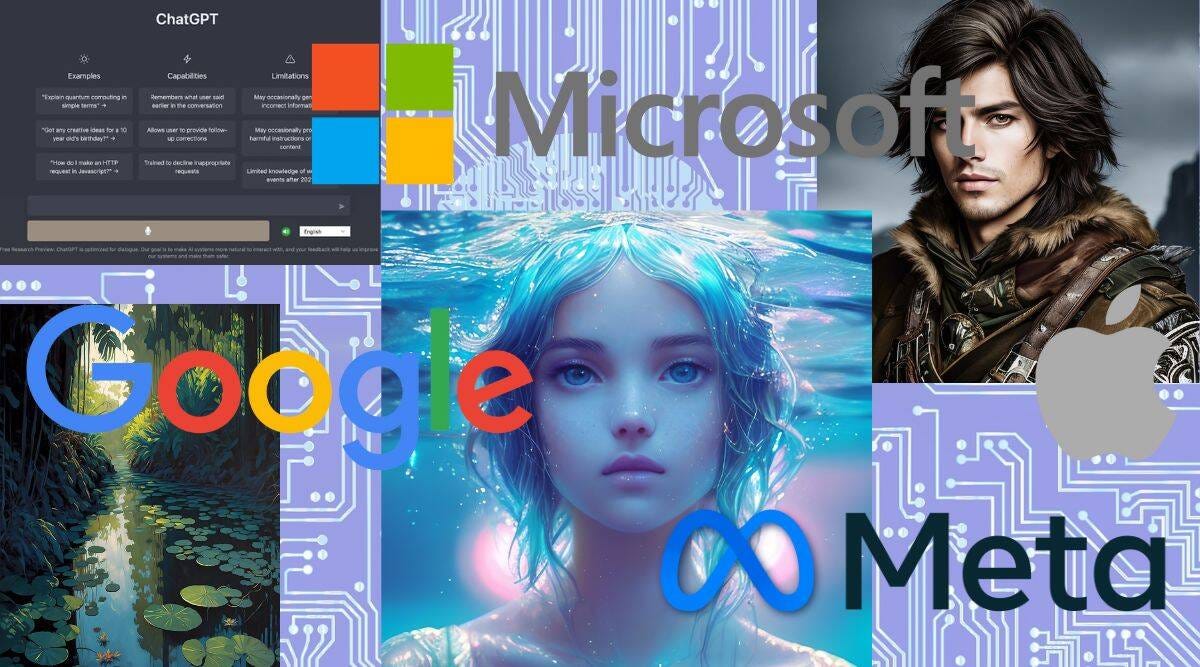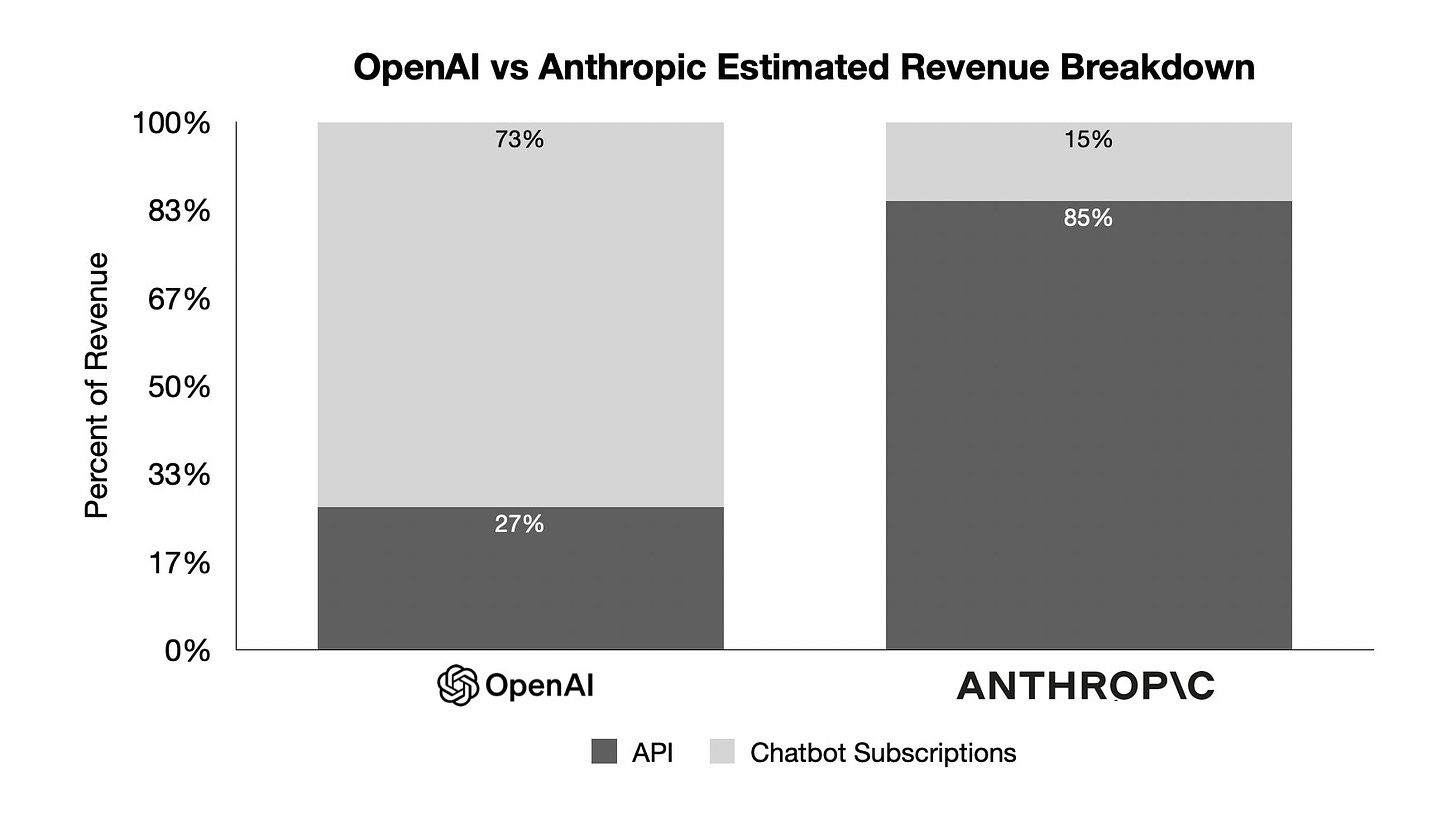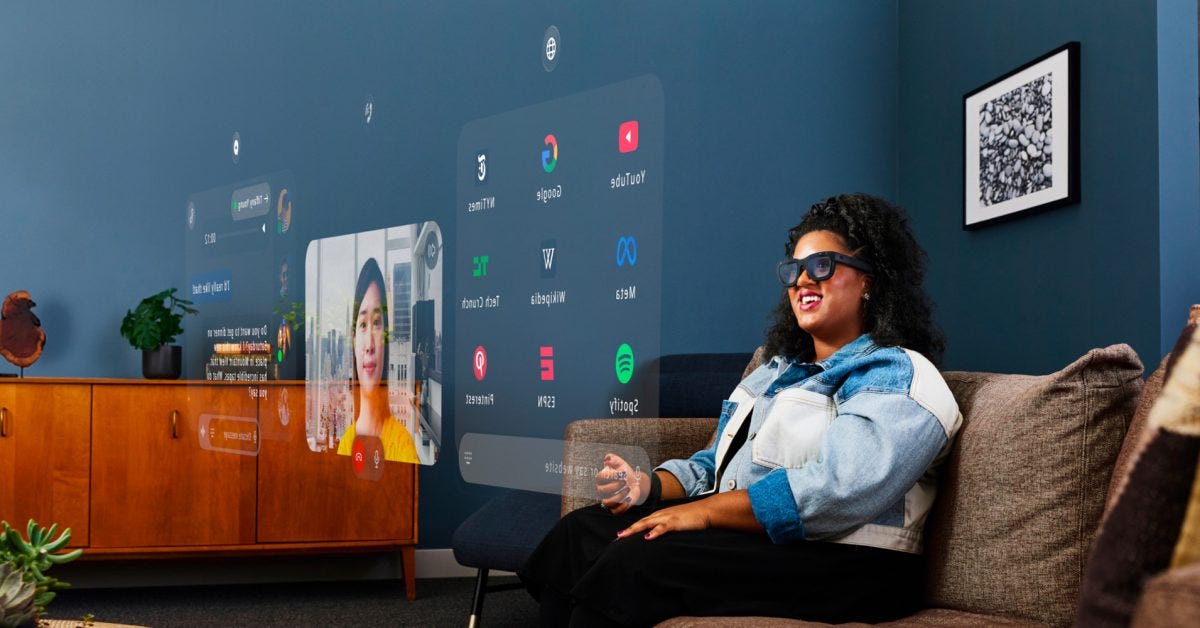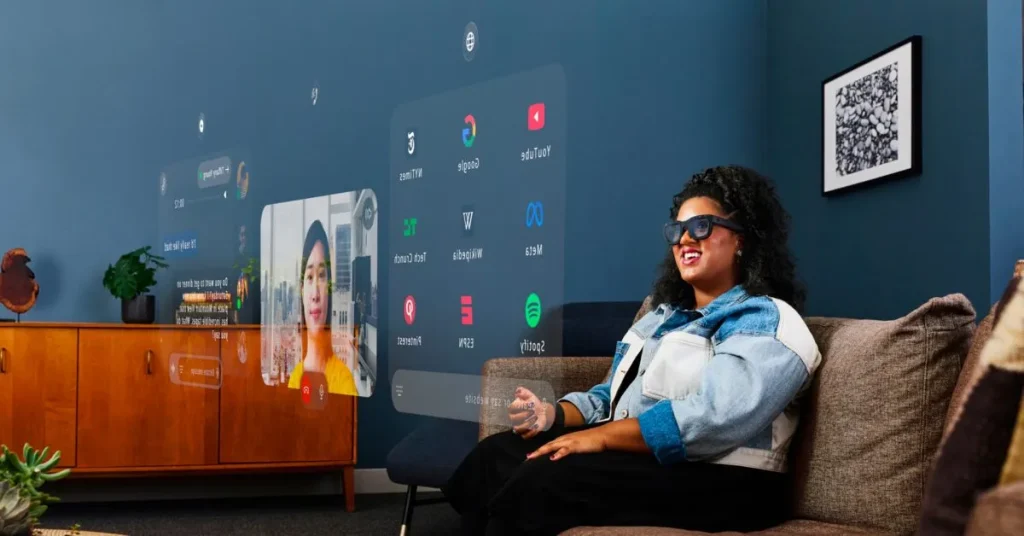In Tech, Having the best product is relatively easy. Building a user base of 3 billion users is hard and expensive, and it will take years for Open AI and Anthropic.
In-short, Alibaba, TenCent, MSFT, Apple, Amazon, Meta, and Google Hold the Keys to AI’s Future simply because they can take AI capabilities to billions of user in a day, all they need is a better use case and a well done AI feature.
As the AI race heats up, one burning question looms over the industry: Can OpenAI build its own distribution network faster than Google can perfect its AI product?
Distribution is key, as shown by Anthropic’s revenue breakdown, with about 75% coming from its third-party API through a partnership with Amazon.
In the AI world, there are two distinct battles being fought—one over who can build the best product and the other over who can dominate distribution.
OpenAI and Anthropic may have some of the most advanced AI models on the market, like ChatGPT and Claude, but the real power still lies with giants like Microsoft (MSFT), Apple, Amazon, Meta, and Google, who already own the distribution channels that can push AI to billions of people globally.
Anthropic and OpenAI: Best Products, But Challenging Distribution
Anthropic and OpenAI have undoubtedly created groundbreaking products. ChatGPT is leading the AI assistant market, while Anthropic’s Claude models have received praise for their sophistication in various use cases.
But building a world-class product is just one part of the equation—getting it in front of as many users as possible is where the challenge lies.
Right now, both OpenAI and Anthropic are trying to build their own direct-to-consumer products to capture more revenue. This is evident in OpenAI’s push with ChatGPT, which has evolved from a simple chatbot into a full suite of services for businesses and consumers.
Read Related: Artificial Limits: Evaluating AI’s Potential to Transform or Disrupt Human Life
Similarly, Anthropic is working on expanding Claude’s reach. However, the road to massive adoption isn’t easy, and this is where the big tech players have the upper hand.

The Seven Seas: Masters of Distribution
Alibaba, TenCent, Microsoft, Apple, Amazon, Meta, and Google have spent decades building distribution networks that are near impossible to replicate. These tech giants have embedded themselves so deeply into people’s lives that they can push new AI products to millions—if not billions—of users almost instantly.
- Microsoft: With its partnership with OpenAI, Microsoft has integrated AI into everyday tools like Word, Excel, and Azure. This instantly puts OpenAI’s technology in front of countless business users.
- Apple: Through the iPhone and Mac, Apple has direct access to a loyal user base and has integrated AI-powered features across its devices.
- Amazon: AWS has become a major player in AI distribution, powering cloud services for companies worldwide. Amazon’s partnership with Anthropic via AWS Bedrock is already driving the majority of Anthropic’s revenue.
- Meta: With Facebook, Instagram, and WhatsApp, Meta has a ready-made distribution network that can instantly bring AI tools to billions of users.
- Google: Search, Android, and YouTube give Google an unparalleled ability to deploy AI at scale, making them a powerful player in AI distribution.
These companies don’t have to build new channels—they just plug in the latest AI and distribute it through the vast networks they already control. This is a massive advantage.
AI Revenues: The Race to Scale
While OpenAI and Anthropic are pushing to grow their direct-to-consumer revenue, they’re still heavily reliant on partnerships with these tech giants for distribution. OpenAI’s deal with Microsoft and Anthropic’s partnership with AWS are driving large portions of their revenue, making them more competitive in the market.
The direct-to-consumer approach is promising but costly. It takes enormous amounts of capital to build the kind of infrastructure and brand loyalty that the big five tech companies already have. That’s why Anthropic and OpenAI are raising billions—because scaling distribution on their own is a monumental task.

Not to underestimate the role capital plays.
After they raised the largest VC round ever, OpenAI optimistically projects its revenue will reach $100 billion in 2029, Capital plays a pivotal role in determining winners in AI, often surpassing the importance of distribution through major tech platforms.
While having access to a broad user base is crucial for scaling, substantial financial backing allows companies to invest in cutting-edge technology and infrastructure. The costs of high-performance computing resources, specialized AI chips, and cloud computing are enormous, often beyond the reach of smaller startups.
Additionally, attracting and retaining top-tier talent—such as data scientists and AI researchers—requires competitive salaries and equity packages, which well-funded companies can more readily provide. This financial advantage enables them to run sophisticated models that deliver superior AI performance and stay ahead in a rapidly evolving field.
Moreover, large capital reserves facilitate extensive investment in research and development, enabling continuous innovation in areas like reinforcement learning and new neural network architectures.
Companies with significant funding can scale operations efficiently, fund compliance efforts for navigating regulatory landscapes, and pursue strategic partnerships or acquisitions to bolster their capabilities.
This flexibility allows them to take risks and make long-term bets on emerging technologies, ultimately driving market creation and consumer education around AI applications. In summary, while distribution is essential, the ability to raise substantial capital is often the defining factor that positions companies as leaders in the competitive AI landscape

Closing with Final Thoughts: Who Wins the AI Race?
In the long run, the companies that control both product innovation and distribution will be the true winners in AI. OpenAI and Anthropic have nailed the product side, but their growth is still tied to their partnerships with the giants.
On the flip side, MSFT, Apple, Amazon, Meta, and Google already have the distribution nailed, which gives them a huge advantage in this space.
The race is still ongoing, but one thing is clear: having the best product is great, but having the ability to distribute that product to billions is what will truly determine who dominates the AI landscape.
As Meta strides confidently into the AI landscape, Twitter appears to be fumbling around, despite having the resources to compete effectively. The question remains: who will ultimately capitalize on this disparity in execution?
The last question is: Would Athropic build better distribution before Twitter gets the AI to work welll?, Can OpenAI build its own distribution network faster than Google can perfect its AI product? Can OpenAI build its own distribution network faster than META can perfect its AI product features?
Read More articles from Reuben Mwatosya here.

